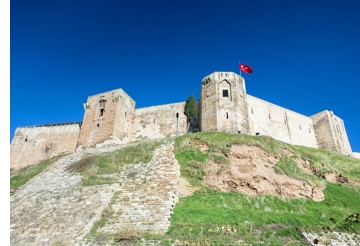“Erasmus+” STEAM in Turkey
 The international Erasmus + project “Creation and Integration of STEAM Model in General Education” took place in Gaziantep, Turkey, on February 21-25. The project partners were warmly welcomed by the lyceum principal, teachers and students.
The international Erasmus + project “Creation and Integration of STEAM Model in General Education” took place in Gaziantep, Turkey, on February 21-25. The project partners were warmly welcomed by the lyceum principal, teachers and students.
After the welcome speeches, group work, active activities and STEAM lessons began. Later, the lyceum hosts introduced the school and rejoiced at the greatest achievements of the students. This school is distinguished by the fact that it educates children from the smallest kindergartens to the school leavers. There are also international baccalaureate classes. At the end of the activities, the participants of the project continued to get acquainted with the old town of Gaziantep: wandered the narrow streets of the old town, learnt more about the history of Turkey, visited the toy museum, which houses exhibits from the 19th century. The day’s activities ended with savoring traditional Turkish dishes. It is no coincidence that this city is included in the UNESCO gastronomic heritage list.
On the second day of the project, the students continued their activities at the school. The first STEAM lesson was devoted to the circular economy. English teacher Aurelija Čebelienė talked about a sustainable lifestyle: sorting garbage, environmental pollution, living without garbage. After completing the practical tasks, the students made and tested toothpaste from natural ingredients: soda, coconut oil, natural peppermint oil. After a break, they were divided into three international groups to compile an international dictionary (Lithuanian-Portuguese-Turkish) on the topic of the circular economy. In the afternoon, the participants of the project visited the Green House, which was built using ecological materials. Innovative solutions have been applied during construction, such as the collection of rainwater, which is used to irrigate plants, and the production of electricity from solar panels. Later, we visited one of the world’s largest mosaic museums, Zeugma. The mosaics on display date back to Roman times.
The third day of the Erasmus + project STEAM Model was dedicated to Turkish history and culture. During the trip to the Urfa region, the project partners admired the olive and pistachio groves through the bus windows and listened to authentic Turkish music. The inhabitants of the country especially appreciate the pistachios grown in this region, which are called green gold. The cotton and maize industry in the Urfa region is well developed, with the construction of a powerful dam and irrigation system in1993. In the past, only cheap barley grew here, and with the start of cotton growing, the country’s economy soared up. If the city of Gaziantep is famous for its gastronomy, then Urfa is associated with the origins of Christianity. Jesus Christ was called to these places. Although he did not come here, he sent a towel to the sick ruler of the city, which healed the seriously ill one. It was a former miracle. Urfa is the cradle of civilization, begun by faith. The first temple in the world, Gobekli Tepe ( X-IX BC), was believed to have had special miraculous powers, such as women coming to pray and hoping to have children. According to archaeologists, this temple dates back to Neolithic times and is older than Stonehenge and the first cities in Mesopotamia. In 2018, the temple was inscribed on the UNESCO World Heritage List. In 1995, excavation of the area began by German archaeologist K. Schmidt. Six temples carved with figures of wild animals and birds (totems) were unearthed. The nomads came around this holy place, growing wheat. This gave rise to agriculture. In addition, project participants visited a 300-year-old Arab settlement near the Syrian border. The cottages resemble hives and are built of clay. The last destination of the trip is the city of Urfa. It is said that Abraham was born there. The city park is decorated with a fish lake. Its water is believed to be sacred and has healing properties.
On the fourth day of the Erasmus + project STEAM Model, teacher Jose Barbosa from Portugal gave a chemistry lesson on “Metals: Better Extraction or Recycling”. After listening to the theoretical material, the students performed chemical tests and practical tasks. During the lunch break, the project teachers met with the school head to share insights about the project. The teachers from Portugal and Lithuania presented the peculiarities of their schools. Divided into three international groups, the students continued to develop a dictionary in three languages: Lithuanian-Turkish-Portuguese.
The last STEAM lesson on Global Warming was given by Turkish physics teacher Ali Tunç. Students discussed in pairs, completed practical tasks, watched video material and shared ideas on how to tackle global warming. After the practical activities, the project participants visited the waste recycling factory. Biomass from household waste is used to heat homes. In addition, the methane gas accumulated in the landfill is collected in pipelines and converted into electricity, which supplies more than 50,000 households. This is one example of the circular economy with real benefits.
On the last day of the Erasmus + project STEAM Model, there was a biology lesson led by a Turkish teacher. After listening to the theoretical material on ISO (food quality standardization) and sharing insights about the damage of fast food to our health, the students had a special practical task – DNA extraction. The lesson exceeded students ’expectations. The participants in the project were particularly focused, step by step, working until each of them finally not only extracted DNA but also created a unique piece of jewelry from their own information bank. Certificates were exchanged and commemorative gifts were handed out on Friday afternoon.
Sincere thanks to the school hosts for their hospitality, friendship, active and exciting lessons. See you in Lithuania!
